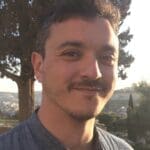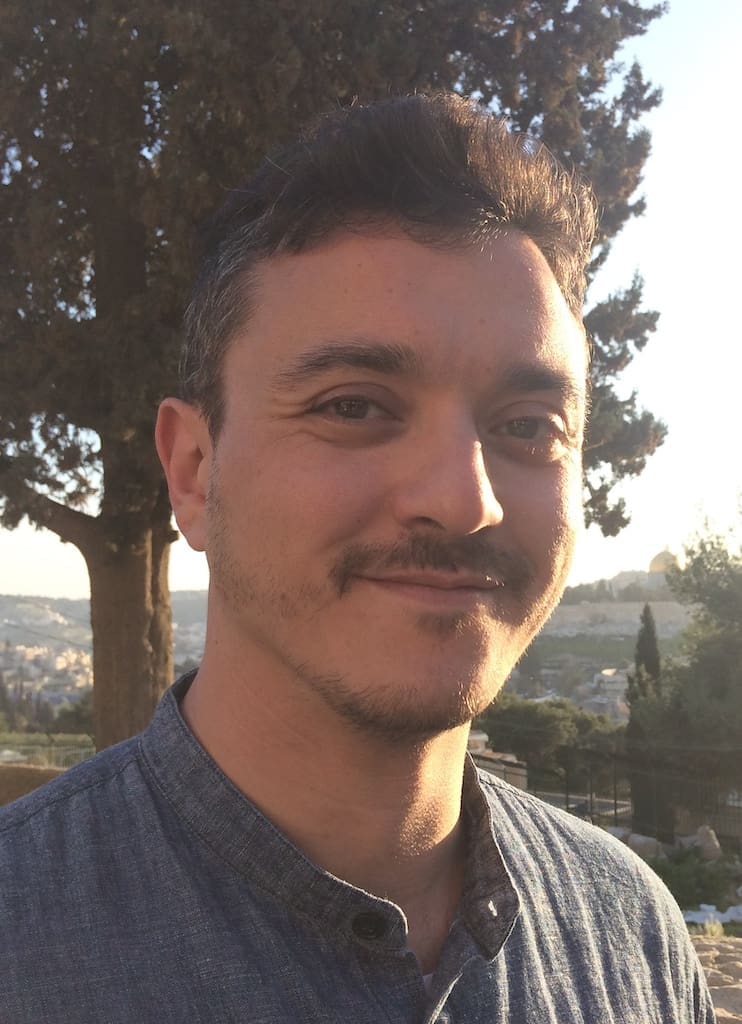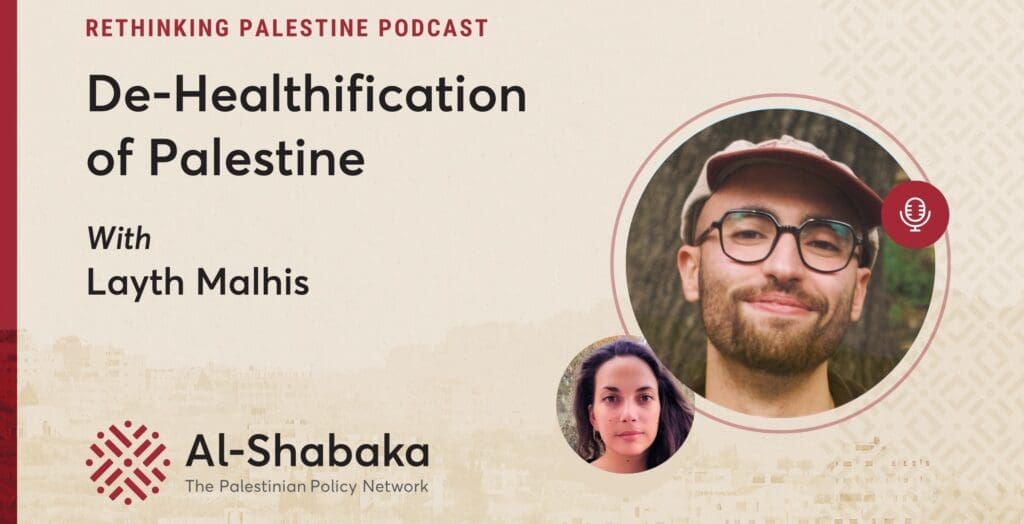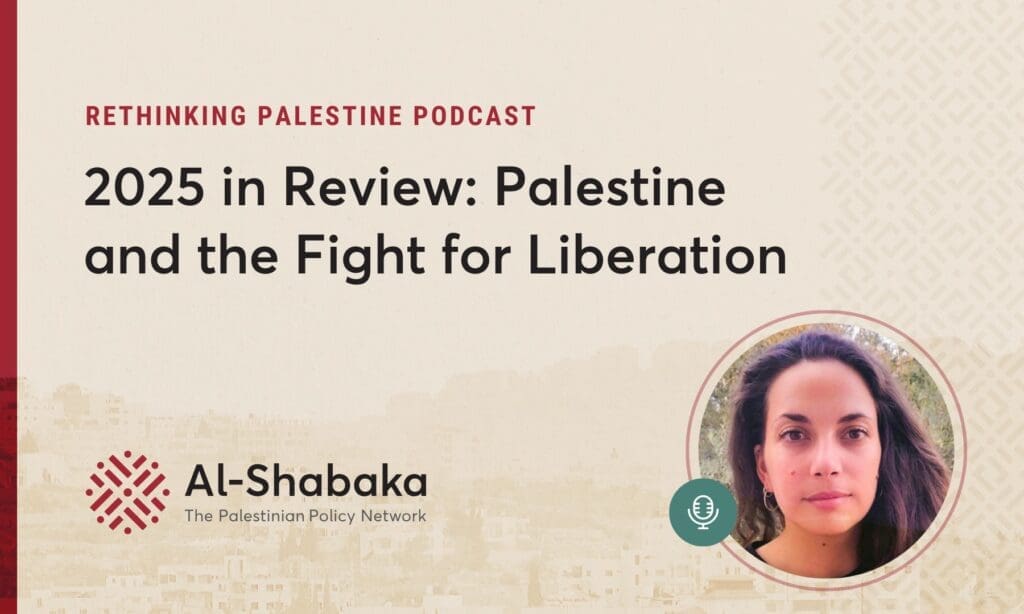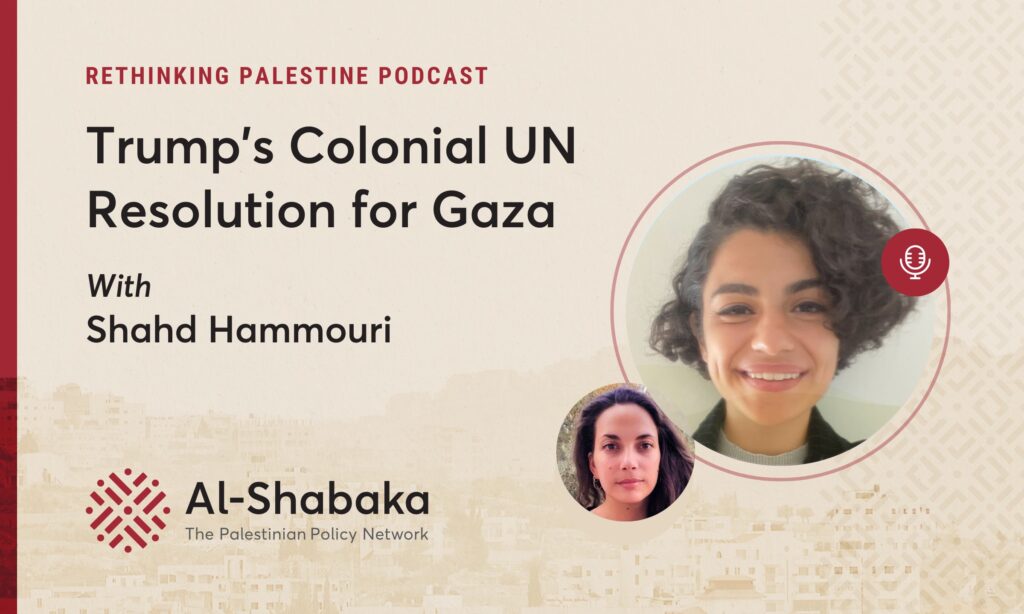About This Episode
Episode Transcript
The transcript below has been lightly edited for brevity and clarity.
Saleh Hijazi 0:00
Amnesty does recognize, and that is in the report, the validity of settler colonial analysis and the complementarity between the settler colonial analysis and apartheid. It just limits itself to then its mandate of work under international human rights law.
Yara Hawari 0:22
This is Rethinking Palestine, a podcast from Al-Shabaka, the Palestinian policy network. We are a virtual think tank that aims to foster public debate on Palestinian human rights and self-determination. We draw upon the vast knowledge and experience of the Palestinian people, whether in Palestine or in exile, to put forward strong and diverse Palestinian policy voices. In this podcast, we will be bringing these voices to you so that you can listen to Palestinians sharing their analysis wherever you are in the world.
Yara Hawari 0:58
At the beginning of February, 2022, Amnesty International published a report condemning the Israeli regime of committing the crime of apartheid against the Palestinian people from the Jordan river to the Mediterranean sea and beyond. Building on decades of research, including Palestinian lived experiences, the Amnesty report explains in intricate detail, how Palestinians are resisting a singular system of domination that operates varying mechanisms and levels of control, depending on where Palestinians live.
Joining me to discuss this report is Saleh Hijazi, head of office in Jerusalem for Amnesty International and Al-Shabaka policy member. Saleh, thank you for joining me.
Saleh Hijazi 1:34
Hello Yara. Hello Al-Shabaka.
Yara Hawari 1:36
So Saleh, perhaps we can start by telling us what this report is about. We know that it condemns the Israeli regime for committing the crime of apartheid, but what else does it say and why has it been published now?
Saleh Hijazi 1:49
The report illustrates how Israel is imposing a system of oppression and domination amounting to apartheid, perpetrating the crime against humanity of apartheid against Palestinians in Israel and the Occupied Territories, and with effects on Palestinian refugees, living outside of Israel and the Occupied Palestinian Territories.
It illustrates how this system, which is a grave human rights violation under international public law, consists of four main pillars. One, the fragmentation of Palestinians geographically, the segregation of Palestinians into different pockets and controlling them violently, dispossessing Palestinians of land and property and depriving them of basic rights, including economic and social rights. Israel is imposing this system with the intent of maintaining Jewish demographic hegemony. Meaning achieving Jewish majority in terms of population and maximum control of land wherever Israel exerts effective control. This intent, this system, and achieving of the intent is maintained through the perpetrating of inhumane acts.
In other words, crimes under international law, including forcible transfer, which is forced displacement. That includes forced evictions, home displacement, and creating a coercive environment that pushes Palestinians out, basically decreasing the number of Palestinians under Israel’s effective control. Two, arbitrary detention and torture, which include for example, administrative detention. Three, unlawful killings. And four, the deprivation of basic rights that include civil political rights, persecution, or economic and social rights. This committing of these unlawful acts or crimes is what also makes it the crime of apartheid. So it’s two things. It’s a system of oppression and domination, amounting to apartheid, and it’s also the crime against humanity of apartheid.
Yara Hawari 3:52
So, how does this report compliment the work that’s been done by Palestinians and Palestinian organizations on apartheid over the decades? And perhaps a follow up question to that is how does this report differ to the Human Rights Watch report, which came out over a year ago now?
Saleh Hijazi 4:07
I think this report and Human Rights Watch’s report, and other reports that came over the last couple of years would not have been possible without the work of Palestinian organizations who pioneered the use of the framework and analysis and the use of apartheid as narrative over perhaps more than two decades. Palestinian started this. Then other organizations, including Amnesty International, have come at this time to kind of build on the body of knowledge produced by human rights organizations about how Israel is perpetrating apartheid against Palestinians in areas under its control and with effect on Palestinian refugees. Each organization between us and Human Rights Watch carried out its investigation independently.
Therefore there are nuances, Amnesty paid a lot of attention to the role of Palestinian refugees, for example, in how by ethnically cleansing Palestine around the establishment of the state and forcibly displacing hundreds of thousands of Palestinians outside of the territory and not allowing them to return home, the right to return, that is a crucial, central part to the system and crime of apartheid that exists today. There was also a lot of emphasis by Amnesty on how the system that exists, that of fragmentation, segregation, control, dispossession of land and property and the deprivation of rights has roots in how Israel treated Palestinians who remained after the establishment of the state.
And yes, were granted citizenship, but were one, kept as second class citizens not equal to Jewish Israelis who are nationals. Two, were placed under military rule, military occupation, basically keeping them in segregated areas and severely restricting their rights. And three, very importantly, it’s how they were dispossessed of their land and property through the establishment of laws or the enactment of laws that existed before with the intent of basically taking this property away and allowing access to them only to Israeli Jews. So Amnesty says that to be able to understand the system fully, which is crucial to be able then to dismantle it, these two components, both Palestinian refugees and how the system of oppression and domination is rooted in the establishment of the state in the years to follow is crucial for proper understanding and proper action.
Yara Hawari 6:41
Now Saleh, this report has been welcomed in the human rights world and international progressive circles as something major and significant. But I think it’s also important to discuss the critiques that are coming from Palestinians and these very but I want to sort of break them down a bit.
And the biggest critique that I’ve seen is the failure to tackle Zionist settler colonialism as really the structure behind the mechanism of apartheid, as the driving force behind the Israeli regime’s policy of erasure towards Palestinians. And this seems to be a glaring emission in not only the, the Amnesty report, but also the reports of other human rights organizations.
And then secondly, the question of Palestinian sovereignty and self-determination also seems to be a crucial aspect that is missing from this analysis.
Saleh Hijazi 7:31
So we’ll take them one by one. In terms of settler colonialism, apartheid and settler colonialism are intrinsically linked. This is a crime that was codified in law, coming out from a certain context, South Africa, which is a settler colonial context.
First, there was the understanding of it as a political structure, a system of domination by one racial group over another. That was then made a crime with a convention in 1973. And then later on in the Rome Statute in 2002. Amnesty is a human rights organization, and its primary framework of work and analysis is international human rights law.
And so this is perhaps a limit, but this is the organization’s mandate. And therefore it looks at duty bearers. Those who have the responsibility to ensure the respect for human rights, the fulfillment of obligations under international law and does its work according to that. And therefore Amnesty does recognize, and that is in the report, the validity of settler colonial analysis and the complementarity between settler colonial analysis and apartheid. It just limits itself to then its mandate of work under international human rights law.
The two things are not opposed. And from my perspective, it’s, you know, another piece of the puzzle. It’s not the whole picture. What Amnesty is doing I mean. And therefore there’s a role of others, primarily us Palestinians, then to be able to use this, to kind of develop the bigger picture and be able to kind of communicate it to wider audiences and be able to use it as a, then a platform for action that would see the dismantling of system of oppression and domination and the settler colony.
So that’s one. Two, the right to self-determination or Palestinian sovereignty. So this is another area where also Amnesty does not take a position because of mandate. So Amnesty does not oppose or support any claim to right to self-determination. It recognizes that this is a right under international law.
It is a right actually under international human rights law. What it does not do is take a position on how the right should be fulfilled because this basically enters the area of politics. So the policy question for Amnesty is what does it mean to implement the right to self-determination? And the answer to that is necessarily political. Because that could be the establishment of a state. That could be establishment of an autonomy. There are perhaps many ways in which the right to self-determination can be fulfilled. What Amnesty is saying is that this is not a place for it as a human rights organization to be prescribing how that should work, including for example, here to the Palestinians.
So Amnesty is in no position to be able to say that yes, Palestinians should have a state or they should not have a state, they should have something else that fulfills their right to self-determination. Similar to any other context around the world.
Yara Hawari 10:41
If you are enjoying this podcast, please visit our website www.al-shabaka.org, where you’ll find more Palestinian policy analysis and where you can join our mailing list and donate to support our work.
Saleh, thanks for that and international law doesn’t provide or really have any provisions for settler colonial contexts. It’s actually very weak in that area and I think that’s not by happen chance. I think that’s deliberate. And so it really does fall on Palestinians to look beyond international law as a framework, when thinking about our liberation and our aspirations for self-determination.
I want to ask you, what do you expect from this report? What might the consequences be on Amnesty’s work? And what kind of influence it will have in the policy world?
Saleh Hijazi 11:33
The launch of the report is the beginning for Amnesty. The beginning of then a campaign. Amnesty is a campaigning organization, international human rights campaigning organization. And the way it works is that it bases campaigns on solid research that it produces on which then it mobilizes members, advocates, sections all around the world to take action in order to achieve human rights impact. In this instance with the apartheid report, this is gonna be long term because once we say apartheid, we need to think dismantle and the dismantling is not gonna come overnight. It’s gonna be a long journey. Amnesty has declared publicly that it is committed to that. No matter how much time it takes that members all around the world and there are 10 million members, hopefully all of them will be mobilized. A lot of them will be mobilized, at least for sure, to be taking consistent actions, to pressure their governments, their parliamentarians, their institutions. International institutions, regional institutions to basically take action against Israel’s apartheid against Palestinians.
So it has committed itself to an anti-apartheid movement. It’ll be only part of it though, because this work is not only Amnesty, it’s Amnesty in partnership with Palestinians, Palestinian organizations, Israeli organizations, other international organizations like Human Rights Watch, to be working altogether in a strategic way to basically bring down Israel’s apartheid against Palestinians.
Yara Hawari 13:13
So Saleh, you mentioned the campaign, but at the end of the report, and quite importantly, especially for our work at Al-Shabaka, there were policy recommendations for third parties and for various different actors. Could you perhaps outline some of these and talk about why that was important to include that in the report?
Saleh Hijzai 13:33
Absolutely crucial because there is a moral and legal responsibility on third states, for example, to take action against apartheid, including by not rendering any aided assistance to a system of oppression and domination of apartheid. So that can include the use of, for example, university jurisdiction. That could be the review of any relations that would contribute to maintaining of a system and the perpetuating of the crime, but that also includes pressure to take action on an international level at the UN.
We have two great opportunities now. One, the investigation by the Office of the Prosecutor at the International Criminal Court. So we, along with other organizations want the Office of the Prosecutor to include in the open investigation, the crime of apartheid, that is perpetrated by Israel against Palestinians. Two, there is the Commission of Inquiry set up by the Human Rights Council. Which one, has a mandate to investigate violations under international law in Israel and not only the OPT as was the case of previous Commissions of Inquiry. Two, it is an evergreen mandate, meaning there’s no temporal scope for it. It is a permanent rights mechanism. Three. It has within it, the Commission of Inquiry, there’s a mechanism that would allow the transfer of evidence collected to the Office of the Prosecutor at the ICC. So also linking these two together in this very intrinsic and important manner.
We want that to be supported. We want states to support and ensure that neither the Commission of Inquiry nor the Office of the Prosecutor are also prone or open to attacks like we’ve seen before by Israel and some of its allies. And so that both are able to carry out their work and that we can see some serious practical steps taken towards accountability.
There’s also a role of third states to ensure that businesses are not complicit or have any direct or indirect contribution to a maintaining of a system and the perpetrating of a crime of apartheid in Israel and the Occupied Palestinian Territories. There are also calls on the UN Security Council, for example, to impose an arms embargo on Israel and also to impose targeted sanctions.
Unfortunately, we know because of geopolitics, because of the US position, which many times does not make it a third kind of party to this, when it comes to Israel, being a very close ally, does not make this realistic at the time being. So what we need to focus on is how we mobilize people to pressure their parliamentarians, their parliaments, their governments, to create this pressure from inside, from within, you know, third states. At the same time, have this pressure from outside by organizations like Amnesty and others, lobby and advocacy groups, so that states can really deliver on then their responsibility under international law to suppress and punish the crime of apartheid.
Yara Hawari 16:49
Perhaps finally, are you at all hopeful that third states might heed the call and listen to your recommendations? And are you hopeful that this report will make significant impact?
Saleh Hijazi 17:02
I am. I think, now with Amnesty joining the consensus among civil society, global civil society, has become clearer and that we are able to, either we have, or very soon will be experiencing a turning point, where our right, maybe unfortunately, for the victims on the ground for Palestinians who are carrying the brunt of this oppressive, violent dominating system and are victims of a crime against humanity may not see kind of the, the impact immediately, but that it is no longer business as usual. It’s no longer that Israel is able to do this without any obstacles without any cost. And that this particularly this year, perhaps 2022 is when this turning point is gonna be very clear to us and others around the world.
Yara Hawari 18:00
Saleh, thank you so much for joining me.
Saleh Hijazi 18:03
Thanks, Yara. Thanks, everyone.
Yara Hawari 18:07
Thank you for listening to Rethinking Palestine. Don’t forget to subscribe and leave us review. For more policy analysis and to donate to support our work, please visit our website, www.al-shabaka.org. You can also follow us on Facebook and Twitter.







